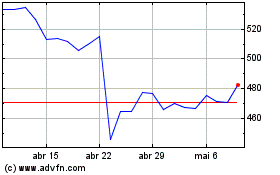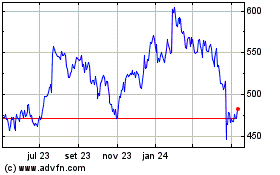Yuan Falls on MSCI Exclusion of Chinese Shares
15 Junho 2016 - 1:20AM
Dow Jones News
Global index provider MSCI Inc.'s surprise decision not to
include China's A shares in its widely tracked benchmark indexes
sent the yuan tumbling Wednesday, with the currency briefly
reaching its weakest level against the U.S. dollar since January
2011 before recovering slightly.
The onshore-traded yuan weakened to 6.6047 to the U.S. dollar
from its official Tuesday closing of 6.5905, a 0.2% depreciation.
The yuan then rebounded to its current level of 6.5967, as stocks
in Shanghai clawed back from a 1.0% opening loss to gain 0.5%.
Meanwhile, the offshore yuan, traded in Hong Kong, touched a
four-month low of 6.6152 to the U.S. dollar before rebounding as
well.
Earlier, China's central bank set Wednesday's yuan benchmark
rate at 6.6001 against the dollar, its weakest fixing since March
2011, 0.3% weaker than Tuesday's rate of 6.5791.
MSCI said its decision, announced Tuesday, reflected
international investors' concern about the Chinese stock market's
openness and the effectiveness of the newly imposed regulatory
changes.
The yuan's breach of the psychologically significant 6.6000
barrier may have triggered orders from clients of investment banks
to sell their yuan positions to reduce losses, which would
exacerbate the currency's depreciation. Chinese authorities can be
expected to intervene to cushion the currency if it weakens
significantly, as they did in January.
The yuan's weakening also exerts a toll on other Asian
currencies, particularly those that are managed by a trade-weighted
basket, such as the Singapore dollar. A falling yuan could set off
a chain reaction of currency depreciation across the region.
The Japanese yen slipped, surrendering some of its recent gains
to reach 106.30 due to haven U.S. dollar buying. Fears of a
"Brexit" crowded out the influence of Thursday's Bank of Japan
monetary policy decision. The BOJ is unlikely to announce further
policy easing, which could result in a stronger yen as the market
pares bets on yen intervention measures. The Australia dollar
declined initially but then bounced back as stocks in Shanghai
recouped initial losses. The euro remains undermined by bearish
implications of the "Brexit" vote.
Wednesday's weaker yuan fixing wasn't unexpected as the ICE U.S.
dollar index rallied overnight due to haven-buying ahead of the
June 23 referendum in the U.K. over whether to leave the European
Union.
Write to Ewen Chew at ewen.chew@wsj.com
(END) Dow Jones Newswires
June 15, 2016 00:05 ET (04:05 GMT)
Copyright (c) 2016 Dow Jones & Company, Inc.
MSCI (NYSE:MSCI)
Gráfico Histórico do Ativo
De Ago 2024 até Set 2024

MSCI (NYSE:MSCI)
Gráfico Histórico do Ativo
De Set 2023 até Set 2024
